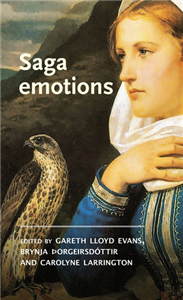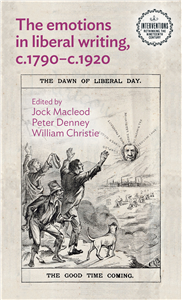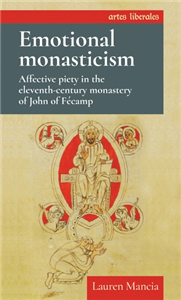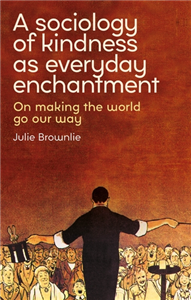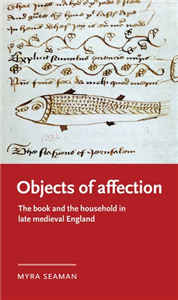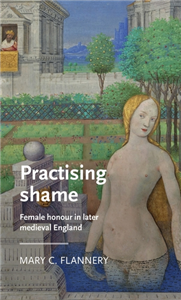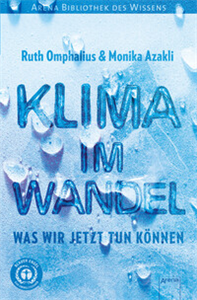Your Search Results
-
Promoted ContentLiterature & Literary StudiesJune 2025
Saga emotions
by Gareth Lloyd Evans, Brynja Þorgeirsdóttir, Carolyne Larrington
Focusing particularly on historically oriented sagas, Saga emotions identifies and examines a range of emotions from across Old Norse-Icelandic saga literature. Each chapter begins with a discrete emotion term, such as reiði (anger), gleði (joy), or the peculiarly Old Norse víghugr (killing-mood), exploring its usages within the broad saga corpus, and focusing on its contextual meanings and narrative purposes. The contributions explore the specifics of the lexical terms used for different emotion states and offer in-depth case studies that consider how various emotions manifest within particular examples of saga literature. The book offers the emotional granularity lacking in current studies of Norse emotion and serves as an essential foundation for future research and study into emotional depiction in Old Norse-Icelandic saga literature.
-
Promoted ContentHumanities & Social SciencesJanuary 2024
Dog politics
Species stories and the animal sciences
by Mariam Motamedi Fraser
Do dogs belong with humans? Scientific accounts of dogs' 'species story,' in which contemporary dog-human relations are naturalised with reference to dogs' evolutionary becoming, suggest that they do. Dog politics dissects this story. This book offers a rich empirical analysis and critique of the development and consolidation of dogs' species story in science, asking what evidence exists to support it, and what practical consequences, for dogs, follow from it. It explores how this story is woven into broader scientific shifts in understandings of species, animals, and animal behaviours, and how such shifts were informed by and informed transformative political events, including slavery and colonialism, the Second World War and its aftermath, and the emergence of anti-racist movements in the twentieth and twenty-first centuries. The book pays particular attention to how species-thinking bears on 'race,' racism, and individuals.
-
 Trusted Partner
Literature & Literary StudiesOctober 2025
Trusted Partner
Literature & Literary StudiesOctober 2025The emotions in liberal writing, c.1790–c.1920
by Jock Macleod, Peter Denney, William Christie
This volume of essays from a selection of distinguished international scholars is the first of its kind to explore in depth the emotional dimensions of liberal writing in Britain over the long nineteenth century. Addressing liberal writing in the public sphere rather than high political or parliamentary liberalism, it comprises a clear, context-setting introduction and eleven substantive chapters. The chapters analyse key texts and figures from the 1790s through to the 1920s and offer several different approaches to the central concern with the emotions and liberalism. These include examining the place of the emotions in the 'good life'; the social and political function of the emotions; emotional rhetoric in liberal writing; and liberal theories of the emotions. Both individually and as a collection, the essays provide an essential foundation for further scholarly work in this emerging field.
-
 Trusted Partner
Trusted Partner
-
 Trusted Partner
Humanities & Social SciencesJune 2021
Trusted Partner
Humanities & Social SciencesJune 2021Emotional monasticism
Affective piety in the eleventh-century monastery of John of Fécamp
by Lauren Mancia
Medievalists have long taught that highly emotional Christian devotion, often called 'affective piety', appeared in Europe after the twelfth century and was primarily practiced by communities of mendicants, lay people and women. Emotional monasticism challenges this view. The first study of affective piety in an eleventh-century monastic context, it traces the early history of affective devotion through the life and works of the earliest known writer of emotional prayers, John of Fécamp, abbot of the Norman monastery of Fécamp from 1028-78. Exposing the early medieval monastic roots of later medieval affective piety, the book casts a new light on the devotional life of monks in Europe before the twelfth century and redefines how medievalists should teach the history of Christianity.
-
 Trusted Partner
Humanities & Social SciencesJanuary 2026
Trusted Partner
Humanities & Social SciencesJanuary 2026A sociology of kindness as everyday enchantment
On making the world go our way
by Julie Brownlie
This book asks us to consider how and why the notion of random acts of kindness and the idea of kindness more generally have come to take a hold in many contemporary English-speaking societies. By introducing and mapping the contours of an emergent kindness industry, marshalling empirical research on contemporary framings of everyday kindness and theoretical resources from cultural sociology to the sociology of emotions and relationships, Brownlie makes the case for a critical sociological engagement with the idea of kindness. In doing so, she argues for kindness to be seen as a form of everyday enchantment - one that, like all enchantments, is ultimately ambivalent.
-
 Trusted Partner
Literature & Literary StudiesJanuary 2026
Trusted Partner
Literature & Literary StudiesJanuary 2026Approaches to emotion in Middle English literature
by Carolyne Larrington
-
 Trusted Partner
Literature & Literary StudiesApril 2021
Trusted Partner
Literature & Literary StudiesApril 2021Positive emotions in early modern literature and culture
by Cora Fox, Bradley J. Irish, Cassie M. Miura
-
 Trusted Partner
MedicineDecember 2016
Trusted Partner
MedicineDecember 2016Emotion-Focused Therapy
A Practitioner’s Guide
by Lars Auszra/ Imke Herrmann/ Leslie S. Greenberg
This title provides a thorough and practical introduction to Emotions-Focused Therapy (EFT). Emotions, central point in EFT, help the patient identify his/her priorities and can be a good starting point for change. This title provides therapists with an overview over the principles and strategies that enable them to work with patients’ emotions in a therapeutic setting and use them to facilitate the changing of behavior. Readers will also find this title to be a rich resource of different techniques, such as empty-chair dialogues as well as suggestions on how to handle typical problems in therapy. Target Group: psychotherapists, specialists for psychiatry and psychotherapy, specialists for psychosomatic medicine and psychotherapy, clinical psychologists, coaches, students and teachers of psychology
-
 Trusted Partner
Literature & Literary StudiesJanuary 2023
Trusted Partner
Literature & Literary StudiesJanuary 2023Objects of affection
The book and the household in late medieval England
by Myra Seaman
Objects of affection recovers the emotional attraction of the medieval book through an engagement with a fifteenth-century literary collection known as Oxford, Bodleian Library Manuscript Ashmole 61. Exploring how the inhabitants of the book's pages - human and nonhuman, tangible and intangible - collaborate with its readers then and now, this book addresses the manuscript's material appeal in the ways it binds itself to different cultural, historical and material environments. In doing so it traces the affective literacy training that the manuscript provided its late-medieval English household, whose diverse inhabitants are incorporated into the ecology of the book itself as it fashions spiritually generous and socially mindful household members.
-
 Trusted Partner
May 2023
Trusted Partner
May 2023Homoeopathy for Cats and Dogs
by Dr. Daniela Birkelbach
Alternatives or supplements to conventional medicine for cats and dogs? Yes, homoeopathy provides holistic therapeutic approaches for our four-legged friends too! Whether they are suffering from anxiety, conjunctivitis, or a tick bite, this book describes the appropriate homoeopathic remedies. The author draws on her many years of experience as an animal healer and presents the most important symptoms and their treatment using homoeopathy.This handy paperback fits into a lab coat pocket and provides:- Basic information on homoeopathy for dogs and cats- Symptoms from A to Z- Characteristics of the most important single-remedy homoeopathic preparations
-
 Trusted Partner
Trusted Partner
-
 Trusted Partner
Literature & Literary StudiesNovember 2021
Trusted Partner
Literature & Literary StudiesNovember 2021Practising shame
Female honour in later medieval England
by Mary C. Flannery, Anke Bernau, David Matthews
Practicing shame investigates how the literature of medieval England encouraged women to safeguard their honour by cultivating hypervigilance against the possibility of sexual shame. A combination of inward reflection and outward comportment, this practice of 'shamefastness' was believed to reinforce women's chastity of mind and body, and to communicate that chastity to others by means of conventional gestures. The book uncovers the paradoxes and complications that emerged from these emotional practices, as well as the ways in which they were satirised and reappropriated by male authors. Working at the intersection of literary studies, gender studies and the history of emotions, it transforms our understanding of the ethical construction of femininity in the past and provides a new framework for thinking about honourable womanhood now and in the years to come.
-
 Trusted Partner
Children's & YA
Trusted Partner
Children's & YAClimate Change. What We Can Do Now
by Ruth Omphalius/ Monika Azakli
“There is no Planet B!” More and more young people are worried about the future of Planet Earth. Climate change is heating not only the planet but also people’s emotions. But what exactly is climate? And why are the changes threatening the lives of both polar bears and us humans. In simple language but with solid science, the authors explain the most important aspects of climate, from the greenhouse effect to the Gulf Stream. Current developments are described as well, and the scientific background is supplemented by gripping reports. The book also offers a glimpse of the future: what will happen if we go on in the same way as now? How can climate change be halted? This makes for riveting reading – and not just for young activists.
-
 Trusted Partner
Humanities & Social SciencesJune 2019
Trusted Partner
Humanities & Social SciencesJune 2019Emotional monasticism
by Lauren Mancia, T. J. H. McCarthy, Stephen Mossman, Carrie Beneš, Jochen Schenk
-
 Trusted Partner
Literature & Literary StudiesMarch 2023
Trusted Partner
Literature & Literary StudiesMarch 2023Sleep and its spaces in Middle English literature
Emotions, ethics, dreams
by Megan Leitch
Middle English literature is intimately concerned with sleep and the spaces in which it takes place. In the medieval English imagination, sleep is an embodied and culturally determined act. It is both performed and interpreted by characters and contemporaries, subject to a particular habitus and understood through particular hermeneutic lenses. While illuminating the intersecting medical and moral discourses by which it is shaped, sleep also sheds light on subjects in favour of which it has hitherto been overlooked: what sleep can enable (dreams and dream poetry) or what it can stand in for or supersede (desire and sex). This book argues that sleep mediates thematic concerns and questions in ways that have ethical, affective and oneiric implications. At the same time, it offers important contributions to understanding different Middle English genres: romance, dream vision, drama and fabliau.
-
 Trusted Partner
The ArtsJanuary 2019
Trusted Partner
The ArtsJanuary 2019Jack Clayton
by Neil Sinyard
In François Truffaut's opinion The Innocents was 'the best English film after Hitchcock goes to America'. Tennessee Williams said of The Great Gatsby: 'a film whose artistry even surpassed the original novel'. The maker of both films was Jack Clayton, one of the finest English directors of the post-war era and perhaps best remembered for the trail-blazing Room at the Top which brought a new sexual frankness and social realism to the British screen. This is the first full-length critical study of Clayton's work. The author has been able to consult and quote from the director's own private papers which illuminate Clayton's creative practices and artistic intentions. In addition to fresh analyses of the individual films, the book contains new material on Clayton's many unrealised projects and valuably includes his previously unpublished short story 'The Enchantment' - as poignant and revealing as the films themselves. This is a personal and fascinating account of the career and achievement of an important, much-loved director that should appeal to students and film enthusiasts.
-
 Trusted Partner
Humanities & Social SciencesMarch 2017
Trusted Partner
Humanities & Social SciencesMarch 2017From Jack Tar to Union Jack
Representing naval manhood in the British Empire, 1870–1918
by Mary A. Conley
Jack Tar to Union Jack examines the intersection between empire, navy, and manhood in British society from 1870 to 1918. Through analysis of sources that include courts-martial cases, sailors' own writings, and the HMS Pinafore, Conley charts new depictions of naval manhood during the Age of Empire, a period which witnessed the radical transformation of the navy, the intensification of imperial competition, the democratisation of British society, and the advent of mass culture. Jack Tar to Union Jack argues that popular representations of naval men increasingly reflected and informed imperial masculine ideals in Victorian and Edwardian Britain. Conley shows how the British Bluejacket as both patriotic defender and dutiful husband and father stood in sharp contrast to the stereotypic image of the brave but bawdy tar of the Georgian navy. This book will be essential reading for students of British imperial history, naval and military history, and gender studies.
-
 Trusted Partner
Trusted Partner
-
 Trusted Partner
Trusted Partner




